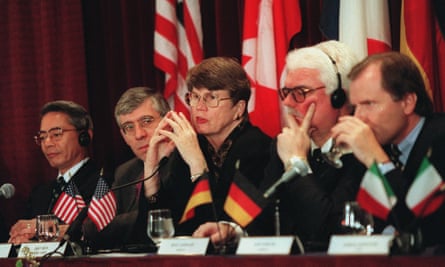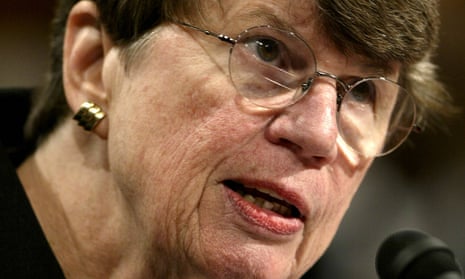Janet Reno, the first woman to serve as US attorney general, has died aged 78.
Reno died early on Monday from complications associated with Parkinson’s disease, her goddaughter, Gabrielle D’Alemberte, said. D’Alemberte said Reno spent her final days at home in Miami surrounded by family and friends.
A former Miami prosecutor who famously told reporters “I don’t do spin,” Reno served nearly eight years as attorney general under Bill Clinton, the longest stint in a century.
Eric Holder and Loretta Lynch, the first and second attorney generals to serve a Democratic president since Reno left office in 2001, were just a couple of the Washington figures to eulogize Reno on Monday morning.
Janet Reno was an inspiration & trailblazer for so many women in law enforcement & government -- including me. She will be dearly missed.
— AG Loretta Lynch (@LorettaLynch) November 7, 2016
Janet Reno. An American original. My friend pic.twitter.com/BfbtLuEEya
— Eric Holder (@EricHolder) November 7, 2016
Reno, one of the Clinton administration’s most recognisable and polarising figures, faced criticism early in her tenure for the deadly raid on the Branch Davidian compound at Waco, Texas, where sect leader David Koresh and scores of his followers died.
She was known for deliberating slowly, publicly and in a blunt manner. Reno frequently told the public “the buck stops with me”, borrowing the mantra from President Harry S Truman.
After Waco, Reno became embroiled in some of the controversies and scandals that marked the Clinton administration, including Filegate, bungling at the FBI laboratory, alleged Chinese nuclear spying and questionable campaign financing in the 1996 Clinton-Gore re-election.
Reno and Clinton endured a somewhat tumultuous relationship, even though she served his cabinet for nearly the entirety of his presidency. The president was famously coy during his 1996 reelection campaign, about his plans to reappoint or replace Reno.
As attorney general, Reno routinely enlisted independent councils to investigate various administration misdeeds, including the Whitewater controversy. That inquiry into a failed 1977 Arkansas land deal involving Clinton was, to the president’s chagrin, allowed to traverse into the Monica Lewinsky scandal as well.
In the spring of 2000, Reno enraged her hometown’s Cuban-American population when she authorised the armed seizure of five-year-old Elián Gonzalez. The boy was taken from the Little Havana home of his Miami relatives so he could be returned to his father in Cuba.

Beyond Waco and the Elian Gonzalez incident, defining moments that bookended her term as attorney general, Reno oversaw the high profile prosecutions of Unabomber Ted Kaczynski and Oklahoma City bombers Timothy McVeigh and Terry Nichols. Reno also brought suit against Microsoft in 1996 for violating the Sherman Anti-Trust Act in a case that was ultimately settled.
After leaving Washington, Reno returned to Florida and ran for governor in 2002 but lost in a Democratic primary marred by voting problems.
The campaign ended a lengthy public career. Born on 21 July 1938, Janet Wood Reno was the daughter of two newspaper reporters and the eldest of four siblings. She grew up on the edge of the Everglades in a cypress and brick homestead built by her mother and returned there after leaving Washington. Her late brother, Robert Reno, was a longtime columnist for Newsday on Long Island.
After graduating from Cornell University with a degree in chemistry, the 6ft-plus Reno became one of 16 women in Harvard Law School’s class of 1963. Reno later said she wanted to become a lawyer “because I didn’t want people to tell me what to do”.
Perhaps one of Reno’s most memorable moments in the public eye came on Saturday Night Live, near the end of her final term at the Department of Justice. For years Reno was lampooned by late-night comedians for her tall stature and occasionally gruff demeanor. In the recurring skit “Janet Reno Dance Party”, actor Will Ferrell would depict a joyless, baritone-voiced Reno hosting dance parties in her basement, aggressively interviewing the young party-goers. In 2001, Reno got in on the gag, joining Ferrell for the last-ever segment.
Clinton tapped Reno to become the first woman to lead the justice department after his first two choices – also women – were withdrawn because both had hired undocumented immigrants as nannies. Reno was 54.
“It’s an extraordinary experience, and I hope I do the women of America proud,” Reno said after she won confirmation. Clinton said the vote might be “the only vote I carry 98-0 this year”.
After just weeks in office, however, Reno became embroiled in controversy with the raid on the Branch Davidian compound near Waco. The standoff had started before Reno was confirmed as attorney general.
On 28 February 1993, agents from the US Bureau of Alcohol, Tobacco and Firearms made a surprise raid on the compound, trying to execute a search warrant. But during the raid gunfire erupted, killing four agents and six members of the religious sect.
That led to a 51-day standoff, ending on 19 April, when the complex caught fire and burned to the ground. The government claimed the Davidians started the fire then shot themselves. Survivors said the blaze was started by teargas rounds fired into the compound by government tanks, and that agents shot at some who tried to flee. Reno had authorised the use of teargas to end the standoff and later called the day the worst of her life.
“It was a dangerous situation,” Reno said of the incident during a 2005 lecture at Duke University. “The tragedy is that we will never know what was the right thing to do.”
Things got no easier after Waco. In 1995, Reno was diagnosed with Parkinson’s after noticing a trembling in her left hand. She said the diagnosis, which she announced during a weekly news conference, would not impair her job performance. Reno would go on to become the longest serving attorney general of the 20th century.
